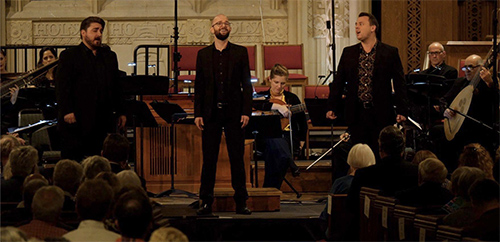by Daniel Hathaway

Not so anymore. Jeannette Sorrell invited an all-star group of period brass players to join the strings and continuo players of Apollo’s Fire for the Orchestra’s recent “Echoes of Venice” programs, allowing the walls of Trinity Cathedral’s nave to resound on Friday, October 18 with the wonderful sounds of cornetti, sackbuts, plucked instruments, and voices in music by Giovanni Gabrieli, Monteverdi, Johann Rosenmüller, Michael Praetorius, Biagio Marini, and Schütz.
“Echoes” was the idée fixe for Sorrell’s program, devised in consultation with Venetian expert Marika Tacconi and expressed literally in pieces like Gabrieli’s Canzon in echo á 12, Monteverdi’s Duo Seraphim, and Schütz’s Jauchzet dem Herren, where you hear the music more than once at varying levels of sophistication. Figuratively, Echoes of The Basilica, of Lamentation, of Love, of Mysticism, from the North, and from Venice organized the program into six sections, introducing echo techniques used by the Venetians in vocal and instrumental chamber music.
The performances were uniformly stunning. Boston’s Dark Horse Consort, named after the bronze horses that decorate the San Marco façade, brought cornettists Kiri Tollaksen and Alex Opsahl, and sackbut players Greg Ingles, Erik Schmalz, Liza Malamut, Ben David Aronson, and Mack Ramsey together with Apollo’s Fire’s resident strings to excellent effect. Sopranos Amanda Powell and Raha Mirzadegan and tenors Jacob Perry and Corey Shotwell were resplendent in Monteverdi’s ebullient madrigals and in the spooky “Duo Seraphim” from the Vespers. Two other sopranos — Rebecca Myers and Madeline Apple Healy — shone in the madrigals.
Alas, a program change deprived us of hearing Tollaksen and Opsahl’s dueling cornetti in Giovanni Battista Riccio’s Canzon a doi soprani in Echo proposta.
Among the highlights of the evening were Giovanni Gabrieli’s well-known, 14-part motet for three choruses, In ecclesiis — which would only have gained in effect from more spatial separation of the performing forces — and, in the second half, two sections from Praetorius’ Meine Seel erhebt den Herren, aka Magnificat.
Unlike Schütz, who paid exploratory visits to Venice twice, Praetorius never heard Venetian music in person, but that didn’t prevent him from replicating its magnificent complexity at home in Germany. Apollo’s Fire did the same in Cleveland.
Published on ClevelandClassical.com November 5, 2019.
Click here for a printable copy of this article


